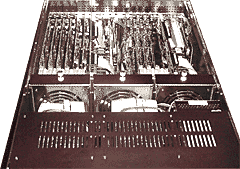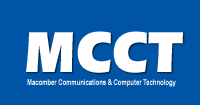MCCT TITAN II IVR Platform
The Titan comes in two versions. Titan I with a single CPU and Titan
II with a dual CPU.The Dual Titan contains two sets of RAID I mirrored
Hard Drives, two DAT Tape Drives, CD-ROM’s and Floppies and
the ability to have each half of the Backplane populatedwith five
dual T-1’s. This gives the capability to have 240 inbound
ports and 240 outbound for each Titan II IVR chassis.
 The
Titan Platforms have been designed to minimize the risk
of lost data. There are Hot-swappable redundant power supplies consisting
of four 200W modules for 800 Watts of power and 99.9% up-time. Notice
as we pull one - then two modules that the IVR is still up and running.
Also notice the alarms, both audible and visible, that occur when
a drive ‘fails’. The visible alarm is from the SNMP
Version 1 Alarm Trap System that is an option to the Titan Platform.
The SNMP Trap Alarm System monitors every function of the Titan
System including Hard Drives, SCSI Controllers, Fans, Temperature,
Processes, Power, Network connections and much more. The
Titan Platforms have been designed to minimize the risk
of lost data. There are Hot-swappable redundant power supplies consisting
of four 200W modules for 800 Watts of power and 99.9% up-time. Notice
as we pull one - then two modules that the IVR is still up and running.
Also notice the alarms, both audible and visible, that occur when
a drive ‘fails’. The visible alarm is from the SNMP
Version 1 Alarm Trap System that is an option to the Titan Platform.
The SNMP Trap Alarm System monitors every function of the Titan
System including Hard Drives, SCSI Controllers, Fans, Temperature,
Processes, Power, Network connections and much more.
The Dialogic Boards can be analog or digital; in
the majority of systems they are digital T-1 or E-1 with Conferencing,
Fax, Voice recognition and Text-to-Speech also available. Here we
have five dual T-1 Dialogic Boards on each half of the Titan II;
this gives us the ability to have 240 inbound and 240 outbound ports.
Each dual T-1 has two RJ-45 connectors - the top is used for inbound
and the bottom is used for outbound. The mean time between failure
(MTBF) for these T-1 boards is one failure in 11.5 million hours.
|
|
|
 |
|
There are two Hot-swappable redundant RAID I
mirrored 18 GB Hard Drives per CPU and there are even three Hot
Swappable Cooling Fans in each chassis. To add to the redundancy,
MCCT has implemented the MicroLite BackupEdge with the added feature
of RecoverEdge. This enhancement allows the IVR to be rebuilt in
a short period should any disaster occur such as power hits, static
or otherwise. With two floppies and the last Master Backup, the
IVR can be rebuilt and re-licensed in a matter of two to three hours.
(13 sec. showing floppy and tape being inserted)
The two CPU boards are Pentium III, 600 MHz (today
- they will become faster as newer technology warrants) with 256
Megabytes of DRAM. MCCT uses the Backplane and CPU approach to these
rackmount systems since this is a more reliable and upgradeable
as well as providing more slots (20 slots for the single CPU chassis;
for the dual split backplane systems, there are 9 slots on one side
and 10 on the other). The Video controller and the Network Interface
are included on the CPU board.
The Adaptec SCSI RAID Controller card is the workhorse
that keeps the two 18 GB Hard Drives mirrored. There is a cache
RAM module of 32 MB which allows the mirroring to be handled on
the Adaptec Board without tying up any of the Operating System’s
CPU time or memory. The bus speed of these Ultra160 Controllers
is 80 MHz. (22 sec. panning the Adaptec SCSI controller)
The DAX Sentry Board handles the environmental
alarms for the MCCT SNMP Trap Alarm System. Heat sensors, tachometer
fan sensors, DC Voltage (+5, +12, -5 & -12) sensors, Power supply
sensors and application sensors are all managed via this board.
The DAX Sentry board occupies the side of the split backplane where
there are 10 slots and uses an ISA slot.
|
|


